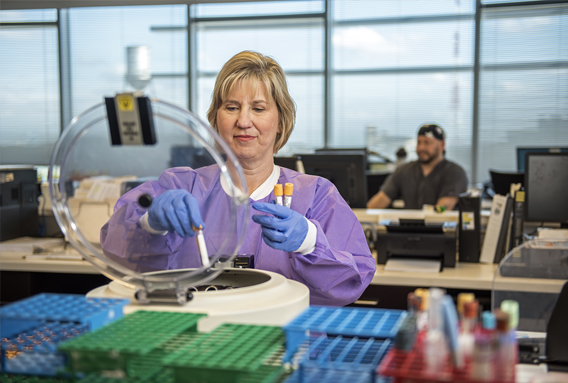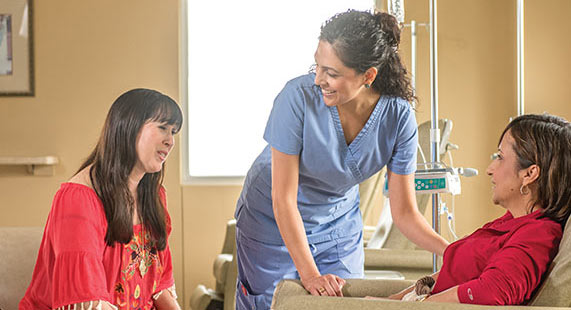Your Treatment and Your Role in Treatment Options
It is important for you to be aware of changes in your body that may be related to your cancer. Stay alert to aches and pains, changes in your body functions, or changes in your appearance. Make notes of these symptoms, then discuss them promptly with your care team.
Your Role in Treatment
Treatment Options
Your cancer treatment plan may include a combination of treatment types.
Treatment Options
Surgery
Surgery can be useful to diagnose cancer, determine its stage of development, and to treat it. One common type of surgery that may be used to help with cancer diagnosis is a biopsy. Learn More.
Radiation Therapy
Radiation therapy is the use of high-energy X-rays to stop cancer cells from growing and multiplying. About half of all people with cancer receive radiation treatment, and for many individuals, radiation is the only cancer treatment they need. Learn More.
Proton Therapy
Proton beam therapy is an advanced type of radiation therapy aimed at destroying cancerous cells using protons. The treatment offers pinpoint precision that delivers high-energy proton beams directly to tumors, minimizing damage to surrounding healthy tissue. Learn More.
Chemotherapy
Chemotherapy is a group of medicines used to treat cancer. While surgery and radiation therapy target specific areas of the body, chemotherapy works systemically (throughout the body). Chemotherapy can also destroy cancer cells that have metastasized to parts of the body away from the original tumor site. Learn More.
Immunotherapy
Immunotherapy is an innovative and advanced form of targeted cancer therapy that boosts your body’s own immune system and defense mechanisms to fight cancer at the cellular level. Unlike traditional cancer treatments that target the cells in tumors, immunotherapy drugs boost the body’s immune system to attack cancer cells to stop or slow their growth or limit the cancer’s ability to spread. Learn More.
Targeted Therapy
Targeted therapies are an advanced form of cancer treatments that more precisely fight your cancer. Learn More.
Precision Medicine
Precision medicine in cancer treatment, or precision oncology, is also called “personalized medicine” and is a rapidly evolving approach to cancer treatment and prevention that allows physicians to select treatments that are most likely to help patients based on a genetic understanding of their disease. Learn More.
Palliative Medicine
Palliative medicine (pal-lee-uh-tiv) is specialized care that aims to improve quality of life for those with a serious illness by adding an extra layer of support to provide relief from the symptoms and stress of illness. Learn More.

Managing Cancer Symptoms and Treatment Side Effects
It is important for you to be aware of changes in your body that may be related to your cancer. Stay alert to aches and pains, changes in your body functions, or changes in your appearance. Make notes of these symptoms, then discuss them promptly with your care team.
Managing Cancer Symptoms

Understanding Lab Results
One of the most important actions you can take in managing your cancer care is to understand and track your laboratory and test results. Knowing what each result means and when and why it changes is essential to taking an active role in your treatment. Be sure to talk openly with your care team about what your results mean.
Understanding Lab Results
Diet and Nutrition
During your cancer treatment, the food pyramid probably won’t be on the top of your mind, but proper nutrition is as important as ever. Your body uses energy to repair tissue and maintain its strength. A healthy diet is an essential building block for allowing your body to repair itself and to resist infection.
Diet and Nutrition
Sexuality and Cancer
It is perfectly natural for people who have been diagnosed with cancer to be concerned about the effect their illness may have on their interest in intimacy. After a diagnosis, you may temporarily lose interest in intimacy as you focus on understanding and treating cancer. Even after treatment, you may have concerns about the effects of the disease and treatment on your desires and performance.
Sexuality and Cancer
Telemedicine
Telemedicine describes a technology that allows you to meet with your doctor from home by using a smartphone or camera-enabled computer. Texas Oncology uses a program called VSee, which functions through a web application that guides you through a virtual waiting room.
Telemedicine
Pharmacy Services and Filling Prescriptions
Texas Oncology’s comprehensive approach to cancer care includes an award-winning, integrated pharmacy. At many of our locations, patients can conveniently fill all their prescriptions and get expert advice and consultation from a pharmacy team specially trained to meet the unique needs of cancer patients. Texas Oncology pharmacists work closely with patient care teams to provide a comprehensive approach to our patients’ oncology care and offer support throughout their oncology journey.
Pharmacy Services
Genetic Risk Evaluation and Testing
Cancer is common, and many families have multiple relatives with cancer. Despite this, most cancers are sporadic and are not passed down through families. When multiple cancers occur in a family, it is usually due to shared risk factors, like smoking or obesity.
Genetic Testing

Self-Help Measures Through Treatment
As you face your cancer diagnosis and treatment, it may be easy to get caught up in the demands of going to treatments, work, and taking care of your home and family. But don’t forget to take good care of yourself.
Self-Help Measures Through Treatment
Clinical Trials and Research
Clinical trials are research studies in which people help doctors find ways to improve health and cancer care. Each study tries to answer scientific questions and find better ways to prevent, diagnose, or treat cancer.
Find a Clinical Trial